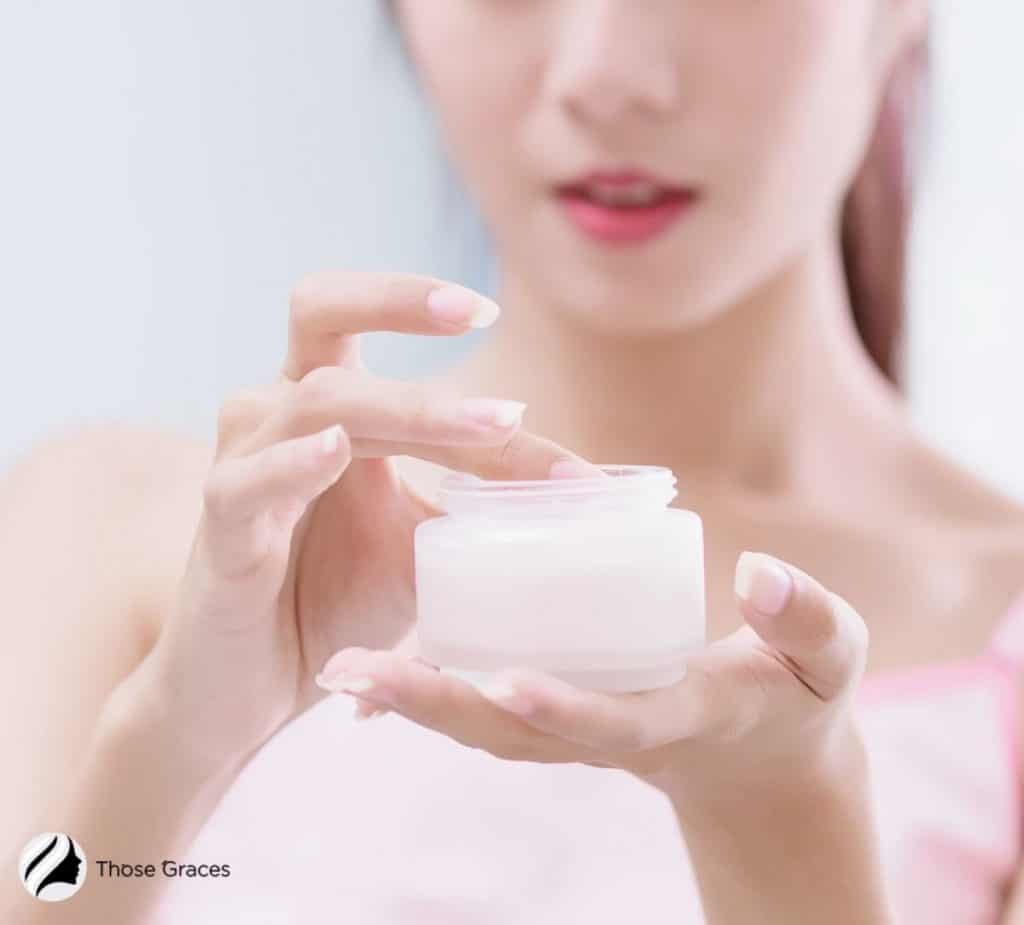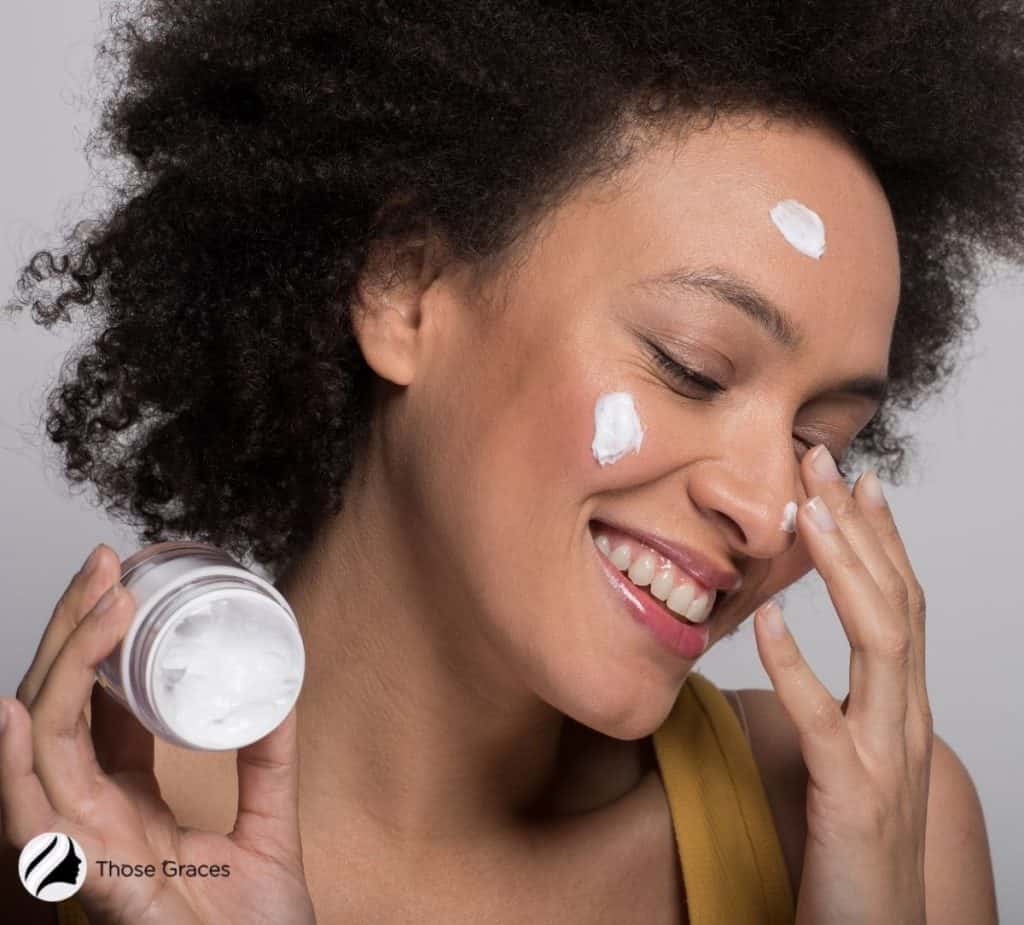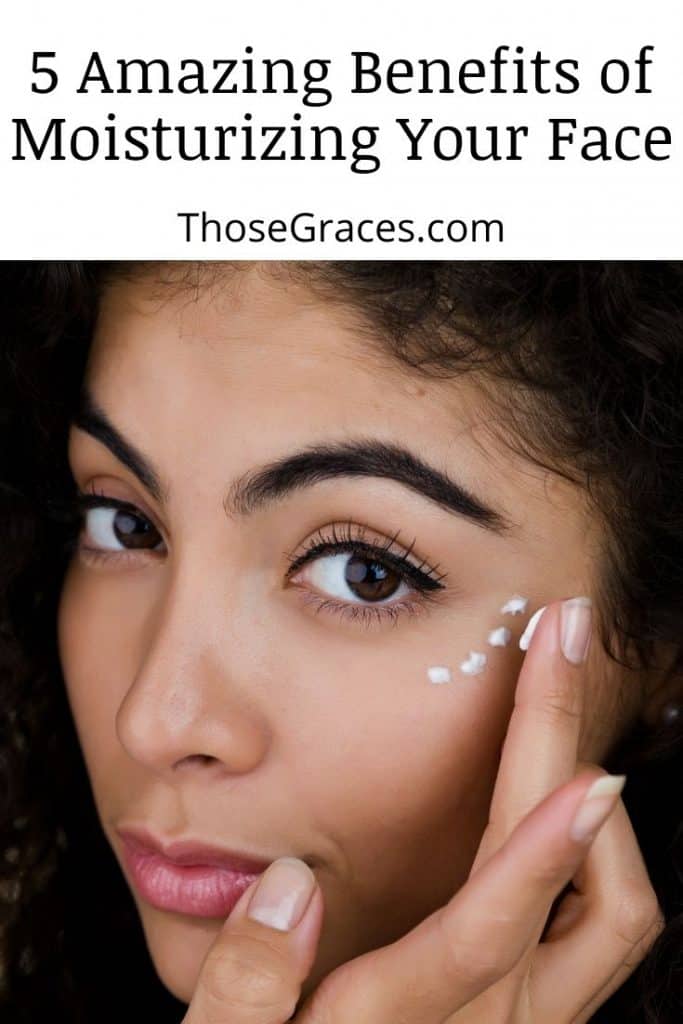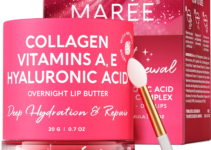Do the benefits of moisturizing your face really outweigh the extra step in your routine or the cost of buying a good cream?
Everyone seems to believe that moisturizing is a great way to maintain a vibrant, youthful-looking face.
But, how does it work and what happens if you don’t do it?
These are all interesting questions, and I’ll provide the answers below.
Table of Contents
What Does Moisturizer Do?

Moisturizer does a lot for your skin. It enhances skin barrier repair and hydration by drawing water to its outermost layer from the air or from deeper within the skin.
It also softens it up and forms a protective barrier to prevent moisture loss.
What Are the Benefits of Moisturizing Your Face?
Let’s start with the heart of the question, the actual benefits.
#1 You’ll Look More Youthful
Although moisturizer won’t magically erase wrinkles, daily application will trap water within the skin.
The trapped moisture will limit the development and appearance of fine lines, making your face look brighter and more youthful.
#2 It Helps With Acne
Acne can make your skin feel oily and greasy, so it may seem logical to avoid moisturizers.
Surprisingly, however, it may be just what you need. Your body produces more oil whenever your skin dries out.
The extra oil often clogs your pores, leading to acne. The right moisturizer will keep this from happening. Moisturizer will also help if you’re using acne treatments like
- Salicylic acid
- Benzoyl peroxide
- Isotretinoin
- Tazarotene
- Adapalene or tretinoin.
These medicines often dehydrate and irritate the skin. Using a moisturizer daily will make them more tolerable.
#3 You’ll Have a Brighter Skin
Most moisturizers come with ingredients like glycolic acid and vitamin E that exfoliate the skin.
In simpler words, these ingredients remove dead skin cells to reveal the brighter, fresher skin underneath.
#4 Improved Resilience Against Toxins and UV radiation
A good moisturizer will repair and reinforce the skin’s lipid barrier. It will prevent pollutants, toxins, and other undesirable substances from breaking through and harming the living cells beneath.
Moisturizers also include a sun protection factor (SPF) to further protect your skin from damaging UV radiation
#5 It Will Soothe Sensitive Skin
Harsh environmental factors and skin conditions will at times compromise the stratum corneum (outermost skin layer), leaving you exposed.
This often triggers an immune response that inflames the skin. Studies have shown that consistent application of moisturizer reduces the levels of inflammatory substances present in the skin, reducing inflammation.
Now let’s look at the downsides of skipping moisturizer.
What Happens if You Don’t Moisturize
While the answer depends on your skin type and overall skin health, here some of the most likely drawbacks of skipping moisturizer.
Dry Skin
Your skin will dry out if you don’t moisturize, and it will worsen during the winter months. It flakes and takes on a dull appearance.
Fine Lines and Wrinkles
Dry skin makes fine lines more apparent. As your face dries out, preexisting wrinkles will become more visible.
It gets worse, unfortunately. The absence of moisture could increase the rate at which your skin wrinkles.
UV Damage
Skipping moisturizers could leave you exposed to UV radiation. This will increase the chances that you’ll suffer premature aging.
How to Choose the Right Moisturizer for Your Skin

The right moisturizer will be one that’s specifically designed for your skin type. If you don’t know what that is, the section below will help you find out and recommend the ideal moisturizer type.
First, wash your face thoroughly with a soft cleanser or mild soap and gently rub it dry with a towel. Wait 30 minutes, then examine your face.
Normal skin
Normal skin will be neither shiny nor flaky when you examine it. It won’t feel right either.
You’ll want to maintain its natural balance, so it’s best to use a moisturizer that has a light, non-oily feel.
Such products usually contain lightweight oils or silicone-derived ingredients like Cyclomethicone.
Oily skin
If it’s shiny throughout, you have oily skin. This skin type is prone to acne and breakouts. However, it still needs moisture, especially if you use skin products that remove oils.
The ideal moisturizer for this skin type is a lotion. It contains more water than creams do, so it’s less likely to cause acne. Avoid products that contain cocoa butter, coconut oil, or petroleum jelly.
Related: 7 Best Korean Moisturizers For Oily Skin To Try
Dry skin
If your skin is scaly or flaky and feels tight when you make facial expressions, it’s dry. You’ll want to use a heavy, oil-based moisturizer to help your skin retain water.
If the shine appears only on the nose and forehead, it’s likely combination skin.
Here are a few other factors to consider
Seasonality – your skin reacts to prevailing environmental conditions like high humidity in the summer and low humidity during winter. For this reason, you may need two different moisturizers.
Age– A moisturizer that worked during your teens might not be the ideal choice in your 30s. Your skin changes over time, so your skincare products should change too. It tends to produce less oil as you age, so it will get dryer. You will need a heavy, oil-based product.
Watch this video and get more amazing tips on how to apply moisturizer on face:
FAQs
Is moisturizer bad for the skin?
Is it good to moisturize your face daily?
Does moisturizer brighten skin?
Conclusion
Now you know all about the amazing benefits of moisturizers for your skin and how to choose one that’s appropriate for your skin type.
The tips covered in this article should be all that you need. That said, you may have a more specific problem that hasn’t been addressed.
If that’s the case, please consider consulting a professional dermatologist.
References
- CeraVe. 2020. “What Type of Skin Do I Have?” Cerave.com. CeraVe. September 2020. https://www.cerave.com/skin-smarts/skincare-tips-advice/what-skin-type-do-i-have.
- Fries, Wendy C. 2010. “Choosing the Right Moisturizer for Your Skin.” WebMD. WebMD. August 26, 2010. https://www.webmd.com/beauty/features/moisturizers#1.
- Purnamawati, Schandra, Niken Indrastuti, Retno Danarti, and Tatan Saefudin. 2017. “The Role of Moisturizers in Addressing Various Kinds of Dermatitis: A Review.” Clinical Medicine & Research 15 (3-4): 75–87. https://doi.org/10.3121/cmr.2017.1363.

What are the benefits of moisturizing your face? Please share with us below!



